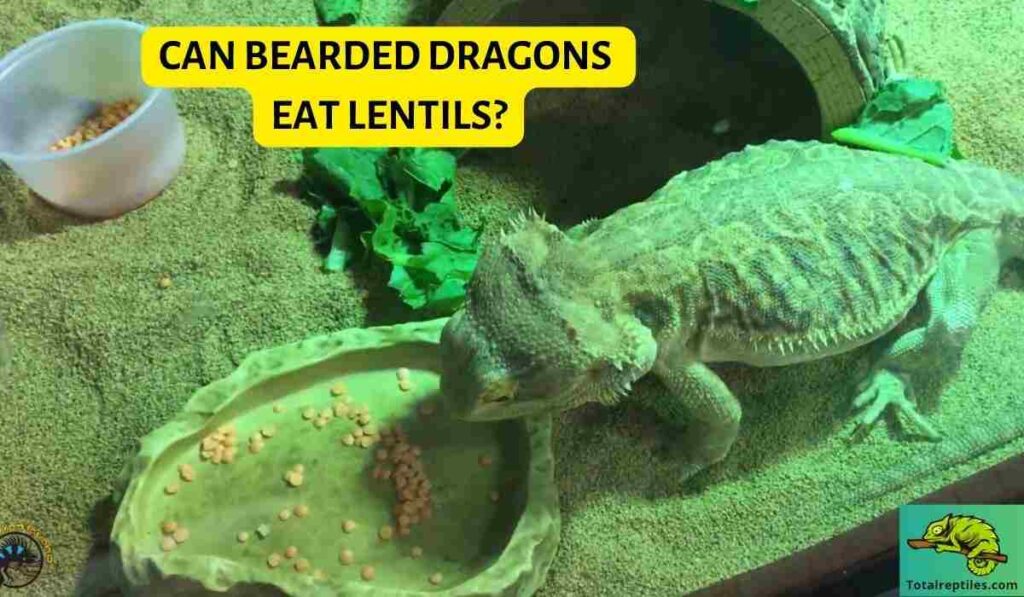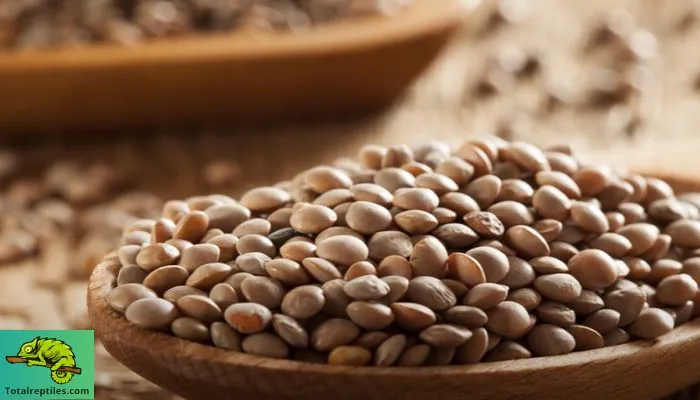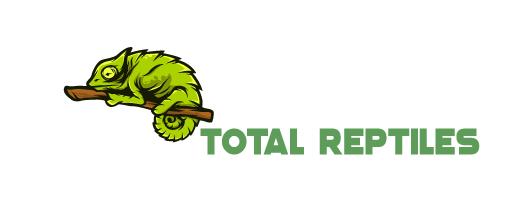The answer is yes, but lentils should only be a small part of their diet rather than being the main source of nutrition. While packed with protein, vitamins, and minerals beneficial for humans, lentils are difficult for beardies to digest properly due to their reptilian gut. Their short stomach is designed to break down proteins from insect prey. Plant matter like lentils contains complex carbs and fiber that take longer to digest. Little amounts of well-cooked lentils are served as a treat.
This blog post outlines lentil nutritional benefits and preparation for your bearded dragon.
The end of This post will help you decide if lentils are suitable for your bearded dragon and how to feed them properly.

Nutritional Profile of Lentils
At first glance, lentils seem like they could make a healthy treat for your pet dragon. Let’s take a look at the nutritional facts:
| Nutrient | Amount per 100 grams |
| Calories | 116 kcal |
| Protein | 9.02 grams |
| Carbohydrates | 20.13 grams |
| Dietary Fiber | 7.9 grams |
| Sugars | 1.8 grams |
| Fat | 0.38 grams |
| Calcium | 20 mg |
| Phosphorus | 180 mg |
| Potassium | 369 mg |
| Vitamin A (IU) | 0 IU |
| Vitamin C | 2.5 mg |
| Vitamin D (IU) | 0 IU |
| Vitamin E (mg) | 0.49 mg |
| Vitamin K (µg) | 2.5 µg |
| Vitamin B1 (Thiamin) | 0.870 mg |
| Vitamin B2 (Riboflavin) | 0.210 mg |
| Vitamin B3 (Niacin) | 2.620 mg |
| Vitamin B6 | 0.361 mg |
| Folate (µg) | 181 µg |
| Iron | 3.33 mg |
| Magnesium | 36 mg |
| Zinc | 1.53 mg |
| Copper | 0.322 mg |
| Manganese | 0.487 mg |
| Selenium (µg) | 2.5 µg |
- High in protein – important for muscle tissue growth and repair
- Rich in B vitamins – aid metabolism and nutrient absorption
- Source of iron – supports oxygen transportation in the blood
- Contains calcium – needed for strong bones and shells
- High in fiber – promotes GI health
These nutrients are all beneficial for reptiles. But there are some downsides to lentils, too:
- Lack of vitamin D3 – needed for calcium absorption
- Contains phytic acid – impairs mineral absorption
- High oxalate content – binds to calcium, limiting uptake
Since bearded dragons can’t digest plant proteins as well, they won’t reap all the amino acid benefits of lentils. The anti-nutrients also decrease the bioavailability of minerals like calcium.
Best Food Alternatives to Lentils
Rather than relying on lentils as a staple food source, there are better options to feed your bearded dragon:
Insect Protein
Crickets, roaches, silkworms, hornworms, and black soldier fly larvae offer complete proteins containing all the essential amino acids. Reptiles quickly digest their meat-based proteins.
- Dust insects with calcium + D3 and multivitamin supplements 2-3 times weekly. This provides usable calcium and nutrients.
Leafy Greens
Greens like collard, mustard, turnip, and dandelion provide vitamins A, C, K, calcium, iron, and carotenoids. Shredding greens can help young dragons transition to veggies.
- Give a variety of greens. Rotate offerings to prevent picky eating.
- Chop greens small for juveniles. They instinctively prefer bite-sized pieces.
Squash and Root Veggies
Squashes like butternut contain beta-carotene, vitamins, and minerals. Sweet potatoes offer vitamins A and C, calcium, and carotenoids.
- Cook squash and root vegetables for easier digestion. Mash or shred for young beardies.
- Limit high oxalate veggies like spinach, which binds calcium.
This balanced combo fulfills all your bearded dragon’s nutritional needs without lentils.
Can Bearded Dragons Have Lentils as a Treat?
While lentils don’t work as a dietary staple for bearded dragons, small amounts can be offered as an occasional treat. Here are some tips for feeding lentils:

- Cook the lentils thoroughly until soft. This makes them easier to digest.
- Limit treats to once or twice a week. Overdoing it could lead to loose stools.
- Only feed 1-2 teaspoons per feeding. Moderate portions prevent tummy upset.
- Mix with favorite veggies or fruits. Combining lentils with other foods helps acceptance.
- Stop feeding if you notice signs of diarrhea. This could signal digestive issues.
Monitor your bearded dragon closely when first offering lentils. Stop feeding immediately if any adverse reactions occur. Consult an exotic vet if health concerns arise.
Overall, lentils are not necessary to a bearded dragon’s menu. But when fed judiciously, they can add variety to your pet’s diet.
FAQ
1. What beans can bearded dragons eat?
Green beans can be eaten raw, cooked, frozen, or canned by bearded dragons if they are fresh and pesticide-free. Beans are high in beta carotene and vitamin B, but pairing them with calcium-rich dark leafy greens, papaya, figs, and acorn squash can prevent MBD.
2. What live protein can I feed my bearded dragon?
Some live protein options for your bearded dragon include crickets, mealworms, superworms, dubia roaches, and black soldier fly larvae. It’s important to gut-load these insects with nutritious foods before feeding them to your bearded dragon. The amount and frequency of live protein feeding will depend on the age and size of your dragon.
3. Can bearded dragons eat lentil sprouts?
Bearded dragons can eat lentil sprouts, but only in small amounts. Lentil sprouts offer more nutrients than lentils, but their high protein and fiber content might cause stomach issues if overeaten. Only serve a handful of lentil sprouts as a snack or treat.
Conclusion
Lentils are not ideal for bearded dragons compared to insect proteins and leafy greens. While lentils contain beneficial nutrients, compounds like phytic acid reduce how much nutrition bearded dragons can absorb.
Adult dragons can tolerate very small, occasional portions of cooked, mashed lentils as a treat. Juvenile beardies under 12 months should avoid lentils, as their digestive system is even less equipped to handle complex plant matter.
Lentils won’t harm bearded dragons when fed sparingly in moderation to adults. But they don’t offer enough digestible benefits to warrant regular inclusion in their diet.

